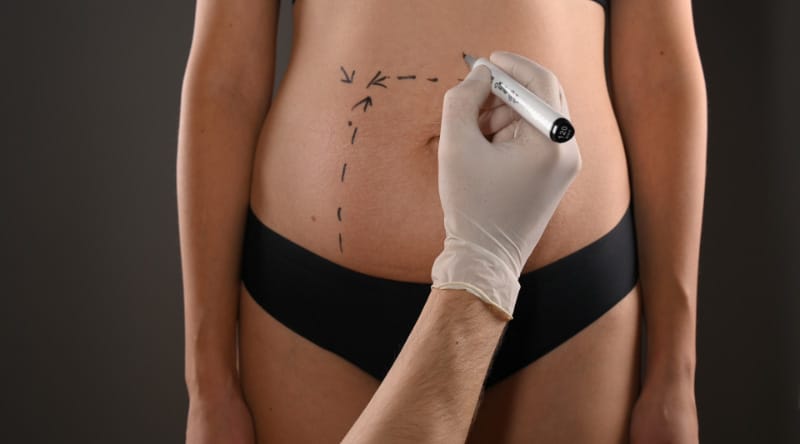Liposuction is a common cosmetic procedure that aims to remove unwanted pockets of body fat from areas of the body such as the abdomen, flanks, upper arms, hips, thighs, and elsewhere. Liposuction can even be performed on the face and areas of the chin and neck — for example to remove the appearance of a “double chin” (called submental liposuction).
While countless liposuction procedures are properly performed every day across the United States, not to mention how popular liposuction in Houston is, patients still wonder: “Is liposuction safe?”
Ahead, we’ll unpack the answer to this question. We’ll take a look at how risky liposuction as a surgical procedure is in general and discuss what potential complications patients should be aware of prior to undergoing this procedure.
Is Liposuction Safe?
Any surgery carries inherent dangers, and liposuction is no different. With that said, for the most part, liposuction is a generally safe procedure. There are rarely problems, and when issues do occur, they are almost always easily manageable.
Why You Should Not Get Liposuction When You Have Risk Factors
The best way to ensure that you have a safe experience when undergoing liposuction is to first make sure that you are a good candidate for this procedure in the first place. Not everyone qualifies for liposuction.
For example, if you are a smoker and are unable to quit for at least several weeks before and after surgery, liposuction will not be safe for you. Smoking inhibits your ability to heal well and may also cause complications during an invasive procedure involving incisions.
Likewise, patients who have chronic medical conditions such as diabetes or high blood pressure may be at higher risk during and after a procedure like liposuction.
As a result, Dr. Ashley Steinberg may deem these individuals as not good candidates for surgery.
The best candidates for liposuction:
- Are in good general health
- Don’t have poor skin elasticity
- Do not have any chronic diseases that may inhibit their ability to undergo invasive surgery or heal properly
- Are are not going to gain weight and maintain stable weight that they intend on maintaining after surgery
In the end, the risk of liposuction causing problems is unlikely for the majority of individuals.
However, Dr. Ashley Steinberg and her staff have patients’ health and safety at the forefront of their minds. If there is any indication that a procedure isn’t safe for a potential patient, the cosmetic surgery procedure will not move forward.
LIPOSUCTION RISKS AND COMPLICATIONS
Safe as it is, liposuction still carries some inherent risks and complications. It is always recommended that patients learn about and understand these potential liposuction side effects prior to committing to surgery. The more you know about the surgery and the possible outcomes, the better.
Potential risks and complications of liposuction include:
- Anesthesia complications
- Infection
- Liposuction scars
- Bleeding and bruising
- Fluid accumulation
- Poor wound healing
- Discoloration of the skin
- Asymmetries
- Excessive swelling
- Irregular contours
- Blood clots and deep vein thrombosis
- Changes in skin sensation
- Numbness
Liposuction Side Effects Long-Term
Again, any side effects from liposuction are extremely rare. However, in some cases, liposuction side effects long-term may become a problem for patients. These side effects may include:
- Numbness in the treated area and/or loss of sensation that does not return
- Ongoing swelling
- Ongoing bleeding
- Poor wound healing
- Scarring
- Thermal burns
- The need for revision surgery
- Damage to blood vessels, nerves, lungs, muscles, abdominal organs, or other deeper structures
FAQ: LIPOSUCTION AND LIPOSUCTION SAFETY
Are there any risks with liposuction?
Cannula fracture: Altered skin sensation with potential long-term effects. Risk of harm to underlying structures like nerves, blood vessels, muscles, lungs, and abdominal organs. Potential for complications such as deep vein thrombosis, cardiac issues, and pulmonary problems.
Is liposuction safe for belly fat?
Liposuction offers an effective method for sculpting and reshaping the body, including the abdomen, through the removal of excess fat. It’s important to note, however, that liposuction is not a weight loss procedure, and it does not seem to impact the risk factors associated with the development of heart disease and diabetes.
Is liposuction generally safe after pregnancy?
Yes, as long as the patient waits long enough after pregnancy to adequately recover from childbirth, liposuction is generally safe after having children. In fact, it is commonly included in mommy makeover surgery — a procedure that aims to help women get their pre-baby bodies back.
Can lipo damage organs?
It is highly unlikely that any organs might be damaged during liposuction surgery. However, it is technically possible.
This is mostly due to the fact that your plastic surgeon will need to agitate the area beneath the skin in order to prepare the fat for removal. This means physically moving their cannula back and forth quite aggressively at times. And because a cannula is long and thin and made of metal, it is technically possible that it may nick an organ or cause other internal damage.
How long does lipo last?
Technically, liposuction should last forever because the fat cells are permanently removed. However, life happens, and patients may experience weight fluctuations after surgery. It is possible to regain weight where you’ve had liposuction.
At the same time, it’s also possible to keep your liposuction results long-term, especially if you are able to sustain the same body weight over time.
How much does stomach liposuction cost?
Ultimately, your liposuction cost will depend on where you are getting liposuction and how much liposuction you need. The liposuction cost will also depend on whether you plan to have other procedures performed at the same time.
For example, many patients add liposuction to procedures such as tummy tucks or breast augmentation. Naturally, the more procedures you undergo at once, the higher the overall cost. With that said, combining procedures can also save you money.
 Is tumescent liposuction permanent?
Is tumescent liposuction permanent?
Yes and no. Yes, liposuction is permanent in that fat cells are permanently removed during the procedure. On the other hand, it is possible for patients to regain weight, and they may end up gaining in the areas where they had liposuction. This is why it’s so important to maintain a healthy weight after surgery.
Where can I find liposuction near me
Dr. Ashley Steinberg board certified plastic surgeon performs liposuction as well as other plastic surgery procedures for patients in the Houston TX area.
What is the safest liposuction procedure?
Tumescent liposuction stands as the leading choice for liposuction in the United States, representing the most prevalent cosmetic procedure. This method surpasses traditional liposuction in terms of efficacy, safety, and comfort, offering a swifter recovery period.
What the the types of liposuction surgery?
Different approaches in the field of liposuction encompass VASER Liposuction, Laser-Assisted Liposuction, ultrasound assisted liposuction recognized by brand names such as SmartLipo and Slimlipo, which employ laser energy to facilitate the breakdown of fat cells.
Additionally, there is Suction-Assisted Liposuction, where a vacuum-like device assists in the extraction of fat and power assisted liposuction.
LEARN MORE ABOUT LIPOSUCTION IN HOUSTON T
Dr. Ashley Steinberg is a female board certified plastic surgeon in Houston, Texas. Whether patients are looking to improve the contours of their abdomen, slim their jawline, or improve the appearance of their upper arms, Dr. Ashley Steinberg can provide safe and effective liposuction.
To find out if you’re a good candidate for tumescent liposuction, contact our office in Houston TX today, and schedule your consultation appointment.





 Is tumescent liposuction permanent?
Is tumescent liposuction permanent?








